Distribution is one of the major activities in sponsored school across all the project area. Distribution of educational material to students aid us in working as a support system in providing improved and better educational conditions for the students in the sponsored schools. Child package, School package and Teacher packages are distributed in these schools once in a year. Followings are factors which show the importance of this activity in sponsored school.
Need of Distribution
| |
Children come from poor socio economic background |
| |
Parents are unable to provide them basic educational requirements. |
| |
75% Parents are illiterate |
| |
Less concern about their child’s education |
| |
Sponsored schools are not able to cater to all developmental needs due to financial constraint |
| |
Lack of educational materials leads to children’s poor interest in study |
|
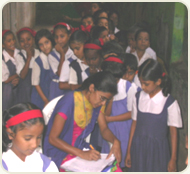 |
Distributed materials helps to increase interest and participation of children in education process
| |
Children enjoy the usage of new materials which leads to increase their involvement in studies. |
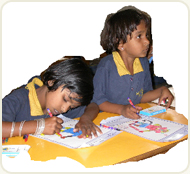 |
| |
Teaching material makes teaching learning method more interesting and easy. |
| |
It creates conducive environment in school . |
| |
Less concern about their child’s education. (Charts, sport materials, teaching aids, furniture, sweaters etc) |
| |
As a result the attendance of children in school is increased. |
| |
The enrolment of children from the nearby communities has increased in sponsored schools. |
| |
Materials like workbook, scholarship book helps to improve the academic performance of children. |
|
Pune Region - Utkarsh Sikshan Kendra |
One of the major problems noticed in the community of Viman Nagar was the lack of financially accessible educational facilities. The children are considered as contributors to the family economy which led to retention of children at homes and hence no formal education. This resulted in many children not going to schools and remaining illiterate. The children get deprived of basic essentials leading to depressions, addictions, frustrations and negative social behavior. The people are unawareness of good hygiene practices and food requirements for good health.
To change this situation we started a play school for children in the slum community. After the children passed the play school, it was noticed that there was an abject lack of good schooling facilities in the area. The nearest school then was more than 2 kilometers away and the children had to cross a busy road to get to the school. This was a deterrent for many parents and as a result they did not send their children to school. One of the suggestions which came up from the community was to start a school in the vicinity of the slum so that most of the children could easily access the school. We acted upon the suggestion coming from the community and “Utkarsh Shikshan Kendra" was established.
The Utkarsh Shikshan Kendra hence aims to achieve hundred percent enrollments of children in school from the community. Equipped with this knowledge we strive to provide suitable opportunities and favorable environmental facilities to bring about maximum development of children through the school programme and practices in all areas. viz physical, intellectual development, emotional, social, and moral development.
The schools also aims at breaking the poverty spiral by giving a large number of children from the slum a chance to get quality education which is on par with that of the rest of the children in the city of Pune.
Long term Goal being to inculcate the following values: To be good human beings with a commitment to improving society. To be confident to achieve the upper limits of their academic and non-academic standards
Process of the Activity
Utkarsh Shikshan Kendra is a primary level school providing quality child centric education.
Primary level school - The day school has a Pre Primary Section comprising of lower KG and upper KG for children between 3 and 5 years. The pre-primary level has a curriculum that teaches age appropriate skills through informal educational strategies. The syllabus is activity oriented and is based on minimum learning competencies. The 3 language (Marathi local Language, Hindi - national language, & English) formula is maintained as suggested by the national policy of education.
The primary school - includes Grades One to seven for children between 6 and 14 years. The primary level has subjects included in the curriculum- as per the syllabus set by the Maharashtra State board. The precise objectives and the minimum competencies are maintained in each area Education is imparted formally in the following areas.
Subjects - English, Hindi, Marathi, Environmental science, Mathematics, Work experience, Science, History, Civics & Geography.
Extra Curricular activities are interlinked and integrated with school subjects:
These activities are as follows :
Physical Education, Art, Craft, Music, Dance, Drama, Sports, Elocution and Needlework .This is to develop their aesthetic sense for appreciation, enjoyment, developing hobbies and later leading to selection of a profession.
In order to create interest in these activities for the children and their parents, the school organizes various programmes during the academic year. The cultural programs are planned in close association with other religious or social events. The chronogram of events is drawn up at the beginning of the year.
The secondary classes- of 8
th, 9
th, & 10
th STD will commence once the permission is granted by the government education board. The classes will follow norms set forth by the regulating body. Presently tuition classes for secondary level education are held.
Education needs to be augmented with provision of complimentary services to assimilate the process of learning. Educationally relevant material according to the syllabus is made available at subsidized rates
Counseling sessions are conducted with the child and the family by the psychologists to tackle the emotional maladaptive behaviors arising due to non conducive environment and problems related to learning.
The government ensures that the teachers are periodically trained to meet with the needs of changing trends in education.
Achievements till date
| |
From educational year 2007-08 we started to participated in Scholarship exam conducted by Maharashtra state examination board. For year 2008-09 for std. 4th our result was 98.83% |
| |
From last year we got 1st prize in clean & net school competition organized by Kirlosker Foundation |
Center for Laborer’s Children
The sole aim of this activity is to cater to the educational needs and increase accessibility of children of construction labourer’s to basic education ensuring that all children who are not a part of the formal education system can also be entitled to education process, paving the way to a successful and productive future.
Modernization and industrialization have paved a good way for the development of the construction industry in India. Small towns and cities have become more urbanized, resulting in Expansion and growth of construction sector. Lack of greater employment opportunity elsewhere has also drawn large number of workers in this sector. There are more than 20 million of construction workers in India at present. Construction works in major cities in India like Mumbai, Pune, Delhi, Bangalore etc are expanding at a faster rate. Migration from different states to these states in India has now become so extensive that its impact is felt in every aspect of life. Migration has become a way of life to many, who are unskilled and semi skilled and find difficult to get better jobs within their natives and locality.
The construction labourers lead a nomadic life and thereby keep changing their places from one city to the other, one construction site to another for better earning of their livelihood. They suffer from extremely poor socio-economic conditions and hence this leads to practices that ultimately affect their children. The construction labourers are mostly illiterate and extremely ignorant about importance of education. Hence their migratory nature of work and their ignorant approach to education leads to exclusion of children from the education system. We have observed in the past that parental involvement in child’s education has a positive influence in phenomenon of inclusion of child in education system. Through this activity we plan to address such issues of ignorance of parents, enhancing their participation and involvement in child’s education apart from ensuring opportunities for education to the child through non formal education centers.
 |
Providing Creche and Non formal education Center
| |
Crèche: To provide safety from the risky environment at the sites and labour camp. |
| |
Non Formal Education Centre
| To provide basic education to the children. |
| To Create an Interest for education among the children and give them the maximum literacy skills. |
| To bring about holistic development through health ,education ,nutrition etc. |
| To mainstream the children. |
|
Create Awareness amongst the Builder, NGO and Parents
| |
Coordination and linkage with other bodies in the field of development
| To achieve effective co-ordination and implementation of policy amongst the builders and NGO. |
| To create awareness among the parents for importance of health and education to meet their basic standards of life. |
|
Achievements till date
| |
The project is successfully running in 459 formal schools in urban and rural area |
| |
1,38,578 children have been benefited though distribution of scholastic material |
| |
Successively reached 3625 teachers and they have started to implement new methods for improving teaching learning process towards quality education. |
| |
Children have developed the reading habits and schools are started to demand more child friendly books for library |
| |
Consecutively reached to19,184 parents through parents meetings thereby making them aware about the importance of education and retention of children in schools |
| |
The sector works in 8 urban slums in Pune with emphasis on women and child development. We are running of 06 preschool (Balwadis) for 150 children in the age group 3 to 6 year and 5 tuition classes for 1st – 7th standard girls and boys comprising of 200 children. Teacher’s training, exposure visits for kids, nutrition for the children are provided at the centers |
 |
Velhe block is one of the most backward blocks in Pune district, situated in Sahyadri mountain region. The entire Velhe block is in interior area and surrounded by the mountains. Velhe is around 60 Km from Pune city. This block is one of the 40 backward blocks in India. The areas between Panshet Dam on one side and Velhe (the Taluka head quarter) on the other are not connected by an all weather road until this day. On one hand it has a rainfall of 300-400 mm but the area faces scarcity of drinking water during summer
Basic needs of this block such as education, health, and infrastructure etc. is yet to be fulfilled completely. The transport facility to reach these villages is improper.
India faces challenges in providing quality early childhood development programs for all children. However, even as the quantity of education has increased over time, the quality of education, especially primary education, remains a cause for serious concern. The experience of many developing countries including India is that children do not master basic literacy and numeracy even after four and five years of schooling. Access to schools is a necessary but not a sufficient condition for ensuring the development of cognitive competencies.
The literacy rate in this block is very poor, especially women education. In Velhe block Zilha Parishad is running total 136 primary schools . Apart from Zilha Parishad. Education boards are running total 11 Secondary schools and 4 Higher Secondary school plus one Collage in Velhe block. According to the survey due to improper and sufficient education facility, school dropout rate is very high. The infrastructure facilities in these schools are not so good.
Most of the village population is illiterate and those who are bit educated are reached till primary education. The reason for these circumstances is the lack of importance of education and inadequate education facilities is villages.
Upto last year Zilha Parishad is running total 136 schools and 15 Wastisahala. but form 2009 onwards all of the wasti schools are converted in regular schools so the number of Zilha Parishad School for 2009 is 150.
Therefore to overcome the above mentioned challenges and to provide quality education, we are working with 146 Zilha Parishad Schools since 2006. The sectors focuses on various activities related to children, teachers & parents via child council, scholastic material distribution, co-curricular activities, teacher training & parent teacher meeting.
Awakening Jagriti team works to reform the type of education that is provided by government & private charitable schools. Government & charitable private schools in India cater to the poorest sections of society and have suffered from years of indifference to the dismal plight of schools. They are plagued by several problems including poor infrastructure, poor teacher attendance, bad teaching quality and complete lack of sensitivity to the communities they cater to. The specific mission is to reform the government schooling system since most of India’s poorest send their children to these schools.
Panshet Hostel
Access to Education is one of the biggest problems faced by children living in remote areas of India. The number of secondary schools is few and far away from clustered dwellings. In some villages the children have to travel long distances on foot to go to school for higher education. In rainy season it is not possible for these children to go to schools as heavy rains cause the contact between villages to be cut off. Such situations results in the child remaining in the home and not attending school.
Velhe has more than 150 villages; the population of each village does not exceed 50. Most of the people living in these villages pursue agriculture. They work in fields or tend to cattle.
Primary education is available in the villages but are at disadvantage due to “One room schools’ & "One Teacher School” concept of the Government. This system is followed due to shortage of teaching staff in remote locations. This results in high school drop outs, poor performance, and lack of motivation for schooling. The number of secondary school is also only ten in number resulting in non accessibility of education for many. This situation has forced many families to leave Velhe in search of education. The population of Velhe has over the years gone down, which is a very disturbing trend.
A residential facility close to a school will ensure the enrollment of children to school. It will give an impetus for girls to pursue education since the hostel will provide safe and secure environment away from home.
Providing hostel accomodation to increase eductional coverage in rural and remote areas
This activity aims at running a residential facility and providing access to children to continue their education. The hostel is already in existence and currently 100 children are benefiting from it. The hostel is called as “Savitri bai Phule Hostel” and is located in the town of Panshet. Panshet has a secondary school, police station, market and a primary health care centre, it is also a place where from all transport in Velhe is centralized. People from far of villages can reach either by boat or by road. The irrigation department has leased a warehouse for setting up of the residential facility at nominal rates to Awakening Jagriti.
The lease is annual in nature and has to be renewed every year. Apart from the existing facility we are also hopeful of leasing another warehouse which is adjacent to the hostel this will enable us in enrolling a greater number of children. The new facility will also help us in creation of space for sports and dining.
Hostel facilities are extended to both boys and girls from the neighboring villages where Awakening Jagriti is working. Children are admitted in the month of June. The facility is open only to children from the classes 5 to 12. Focus is on provision of an environment conducive to access to education and learning.
For overall development children have been assigned duties in the hostel. They contribute by performing their daily chores that is serving meals, keeping the hostel clean and maintaining discipline. To ensure children perform well in school regular tuition classes are being conducted. Their educational progress is closely monitored. Health Issues are taken care of by the organization. Nutritious balanced food is provided. Stationery and toiletries are available in the hostel stores at subsidized rates. Parents are requested to cooperate towards running of the hostel. It is mandatory for parents to attend monthly meeting.
Objective of Activity
| |
To provide welfare activity for intellectual, physically & mentally development of student. |
| |
To provide vocational courses to enable student. |
| |
To encourage student for competitive exam, sports, cultural program. |
| |
Participation of community, student parent, local bodies for the sustainability of hostel. |
Facilities in hostel
| |
Food: Breakfast/ Lunch- Tiffin/ Dinner (Both Veg & Non Veg) |
| |
Clothes: Uniform/ Mattress with Bed sheets/Pillow with cover/ Blanket etc. |
| |
Shelter: Utensils/ Bed/ Toilet & Bathroom |
| |
Educative facility: School stationery/ Coaching classes/ Exposure visits/ Library/ Slide show/ Competitions |
| |
Health: Health check up/ Immunization/ Awareness sessions/ First Aid/ Medical assistance for further treatment |
Some of The Features of Hostel
| |
Co-education Hostel |
| |
Hostel from classes 5th to 12th |
| |
Children attend school in the village of Panshet |
| |
Hostel managed with the help of PTA (Parent Teachers Association) |
| |
PTA has existing membership of 85 parents |
Admission Criteria
| |
Lack of Higher education facility in Villages |
| |
Priority to at least one child from Family |
| |
Priority to Girl’s |
| |
Preference for destitute children |
| |
Preference for children from Tribal Communities |
| |
Preference to children from the villages where we are working |
| |
No. of seat’s which are vacant in the Hostel |
Selection Procedure For Admission
| |
Interview form distribution |
|
Selection of the Students by the priority |
| |
Interview of the Students & Parents |
|
Admission forms distribution |
| |
Home visit |
|
|
Activities With Children
| |
Art & Craft Session |
|
Library facility |
|
Vocational Course |
| |
Social Development Session |
|
Parents Meeting |
|
Home Visit |
| |
Film Show & Slide Show |
|
Exposure Visit |
|
School Visit |
| |
National Day Celebration |
|
Student Appraisal |
|
College Visit |
| |
Internal Exam |
|
Health Facilities |
|
Balsabha |
| |
Different competitions |
|
Special Coaching Class |
|
|
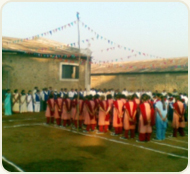 |
Celebration of national Festivals |
Responsibilities in The Hostel
The day-to-day activities in the hostel are divided among children. The aim behind this is that the child should get used to do work at home as well as to learn self-discipline. All the children’s are divided into different shifts and follow their timetable and allocated responsibility.
| |
Boys: Hostel cleaning/ Prepare Tiffin/Serve food |
| |
Girls: Hostel cleaning/ Prepare Tiffin/Serve food |
Achivements till 2009
Out of Total students, 71 students given the Exam of the 10th class & out of the 71 students,54 Students passed the 10th class
The children who have passed out from this hostel and have pursued higher education are encouraged to work in the hostel as teachers, superintendents ect. This is done in order to ensure sustainability of the hostel.
Conclusion
| |
Students have become more confident to attend the school. |
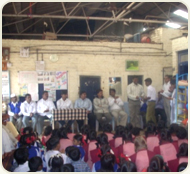 |
Prize Distribution for the different competition |
|
| |
Improved quality of education |
| |
Due to distribution of educational material there is an increase in the regular attendance of school |
| |
There is an increased involvement of parents in education |
| |
To encourage the children for their future improvement |
| |
Children are more aware about different educational programmes |
| |
To develop their internal skill & potentials |
| |
Student’s health is improved |
| |
To motivate for the children to performs in education |
|
| |
Personality of the students is developed |
|
Those children who belong to the Panchet Dam affected villages in Velhe Taluka only are considered for admission in Savitri Bai Phule Hostel in Panchet as per the guidelines and criteria of our organization.
Achievements of Velhe Education Sector
Capacity building of the teachers in the field of Padagogy:
Scholarship trainings have been conducted for the teachers. Due to this activity the passing percentage of the students has increased. 10-12 students passed with distinction marks and have been ranked 2nd in Pune District according to Block Officer.
Provision of the complimentary educational aid material:
Because of provision of school material the students were able to complete their study at home and the percentage of passing is increased. Their attendance also found to be regular. The percentage of school dropout has decreased. Due to our provision of scholastic material, Velhe
Taluka ranked first in Pune District in Pradhnya Shodh Exam. The interest for study has also increased among students.
Balwadi:
Department has started 19 balwadies as a cultural centre in 19 villages. Around 225 children are taking benefit of this facility in Velhe & Panshet block. Teachers are selected from local community and get trained. They are also responsible to distribute nutrition every day to students. Every child who is involved in this activity gets nutrition as well as all necessary material such as stationary, dress, blackboard, chalks, slate, sitting mat cotton etc by organization free of cost.
Interest and participation of parents has increased:
The parents are more responsive and alert about their children’s education, study, attendance at school. They make it a point to send their children regularly to school. They actively participate in their child’s education. They have also understood the importance of educating their girl child. The percentage of girls completing their education has also increased.
School counselling program has improved the academic performance of children:
The activity was started this year. The main objective of this activity is to reduce academic and behavioural problems of students. Problematic cases were found through observation and discussions.
Introduction of extra curricular activities for holistic development:
The students took active participation in the Science practicals. Previously they couldn’t perform well because there was a lack of Science Equipments. Zila Parishad School, Wanjale was ranked First in “Science Exhibition” at Taluka Level in 2008.
Sensitization and awareness programs amongst stakeholder groups:
The interest and participation of the children in various activities has increased. The leadership skills in the students have also increased. Discipline, regularity in attendance amongst the student has increased. Students have become more conscious about their roles & responsibilities.
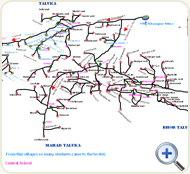 |
Map of the z.p.p. schools |
Access to quality education is still being a dream to many of our children. Though India is implementing some specific projects towards achieving universal primary education, it is still struggling to reach such a huge population. India needs supportive hands from various quarters. In this perspective Awakening Jagriti is taking intensive efforts and meaningful interventions in providing quality education to the children of deprived community.
Awakening Jagriti started its education activities in Nagercoil in the year 2006. The poor academic quality, lack of infrastructure and the psycho social problems found among children had led Awakening Jagriti to implement the project,’ promotion of quality education’ in 45 selected Government Primary and Middle schools.
Quality education requires healthy and self motivated students, well – trained and highly capable teachers, ideal parents having interest on children’s education, enhanced infrastructure and conducive environment for the holistic development of children. By considering all these above stated requirements we are implementing various activities. They are :
Capacity building of teachers in the field of pedagogy
Trainings and workshops are being conducted to enhance the capacity of teachers. Newsletter is being published thrice in a year to provide a common platform to school teachers. Through teacher’s trainings and work shops more than 300 teachers have been benefited. Trainings were conducted on Classroom Management, Millennium Generation Psychology and Child Discipline. Through these trainings teachers were able to improve their profession.
Provision of complimentary educational aid material
The children who study in our sponsored schools come from poor socio economic background and their parents are unable to provide them basic educational requirements. Our Sponsored schools are also not able to cater to all the educational developmental needs due to financial constraints.
This directly affects the academic performance of children thus providing educational material aids to increase their interest and participation in education is felt necessary.
Increasing the participation of parent
We are conducting parent teachers meeting for developing interest and participation amongst parents in their child’s ed ucation. Various efforts are taken to strengthen PTA in the sponsored schools. Parents participation in their children’s education has been increased through theatre shows, resource persons and interactive sessions. Around 8000 parents took active participation in PTM.
School counselling program to improve academic performance of children
Orientation is given to teachers / parents about school counseling program. Counseling is done through individual and group interventions. Teachers are equipped by providing counseling manuals and informative materials. Children, teachers and parents of 5 sponsored schools were benefited out of our Psycho social intervention
Introduction of extra curricular activities for holistic development
We are establishing sports centers in the selected schools to promote extra curriculum activities among children.
Sensitization and awareness programs amongst stakeholder groups
Child councils are formed in 40 sponsored schools. Children’s participation is derived through child friendly methods. Through Child Council childr en could develop and give a boost to their personality, self confidence and various skills like leadership, stage performance etc. We have reached around
Ten Thousand children through child council. Children of our sponsored schools have been organized in to four houses, namely, Red, Blue, Green and Yellow.
Child Right, team spirit, leadership skill, self confidence, discipline, hygiene and various other skills have been imported to the children of child council through cultural programs and other play way methods.
Promoting a better environment for education through construction of class rooms, toilet blocks and water tanks
We have constructed 6 class rooms at 3 schools and renovated 1 existing classroom at one school. We have constructed new toilet blocks at 2 schools and renovated existing toilet blocks at 3 schools. We have constructed water facility at 2 schools.